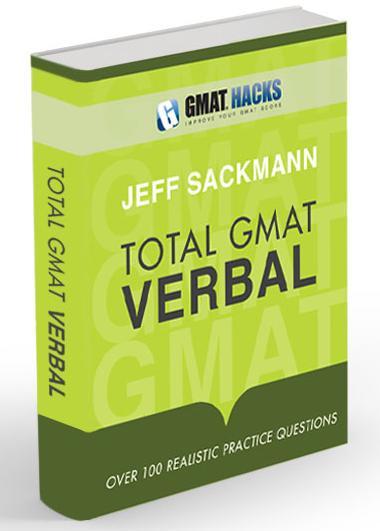
Bookshelf
|
|
Total GMAT Math Jeff's complete Quant guide, on sale now! |
|
|
Total GMAT Verbal Everything you need to ace GMAT Verbal! |
1,800 Practice Math Questions
Buy Jeff's books at Amazon.com

GMAT Official Guide, with IR
OG Math | OG Verbal
OG12 & Quant Rev solutions!
GMAT Question of the Day
Beginner's Guide to the GMAT
GMAT Hacks Affiliate Program

Recent Hacks

Categories
- General Study Tips
- Goals and Planning
- CAT Strategy
- The Mental Game
- GMAT Math Strategy
- GMAT Math Topics
- Mental Math
- Data Sufficiency
- Critical Reasoning
- Reading Comprehension
- Sentence Correction
- Analytical Writing Assessment
- Integrated Reasoning
- IR Explained
- Business School Admissions
- GMAT Prep Resources
- Practice Questions
- Total GMAT Math
- Total GMAT Verbal
- GMAT 111

How is GMAT Integrated Reasoning Scored?
May 13, 2012
| You should follow me on Twitter. While you're at it, take a moment to subscribe to GMAT Hacks via RSS or Email. |
Starting in early June, every administration of the GMAT will replace one of the two AWA essays with a 30-minute Integrated Reasoning (IR) section. You can read a few other articles on this site to learn more about the new format.
The GMAT IR section has nothing to do with your score between 200 and 800. That will still rely entirely on your Quant and Verbal performance. Instead, Integrated Reasoning is treated similar to the AWA--a separate section with a separate score.
Your performance on the Integrated Reasoning section will earn you a score between 1 and 8, inclusive. Only integer scores are possible, so it seems likely that the majority of test-takers will score a 3, 4, 5, or 6, with 7 and 8 reserved for the best performances and 1 and 2 kept for the weakest.
This separate score reinforces my belief that the Integrated Reasoning section will not be a crucial part of MBA admissions for some time yet. Admissions committees can use the Quant and Verbal scores like they always have, and take a "wait-and-see" approach to determine whether the IR score has additional value.
To the extent that MBA programs will look at your IR score in the next few admissions cycles, it is likely to be treated as little more than a box to be checked. Like an AWA score of 2.5 or a Quant score in the 30th percentile, an Integrated Reasoning score of 3, 4, or below probably won't impress anyone at a top program. But between a 6, 7, and an 8, there will be little difference. If you have a reasonably good score, application evaluators won't analyze it further.
Further on, admissions committees will probably discover that IR scores correlate highly with Quant and Verbal scores. Integrated Reasoning does reflect critical thinking skills--which is also a huge part of what the main GMAT sections evaluate, especially for test-takers scoring 650 and above. At that point, it's not about grammar rules and math formulas anymore. If you are well prepared for GMAT Quant and Verbal, you are likely to do well on IR, as well.
About the author: Jeff Sackmann has written many GMAT preparation books, including the popular Total GMAT Math, Total GMAT Verbal, and GMAT 111. He has also created explanations for problems in The Official Guide, as well as 1,800 practice GMAT math questions.
 |
Total GMAT Verbal
The comprehensive guide to the GMAT Verbal section. Recognize, dissect, and master every question type
you'll face on the test. Everything you need, all in one place, including 100+ realistic practice questions. |